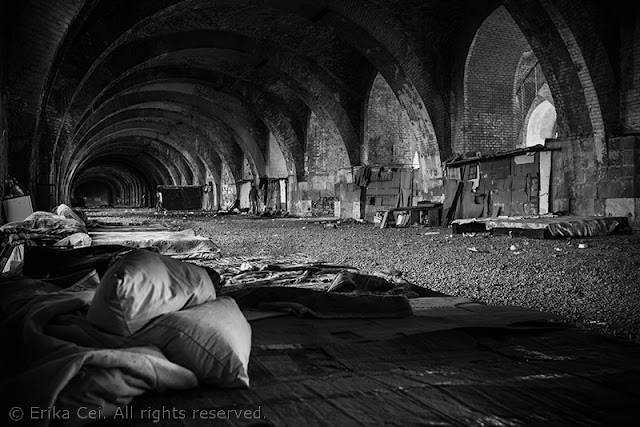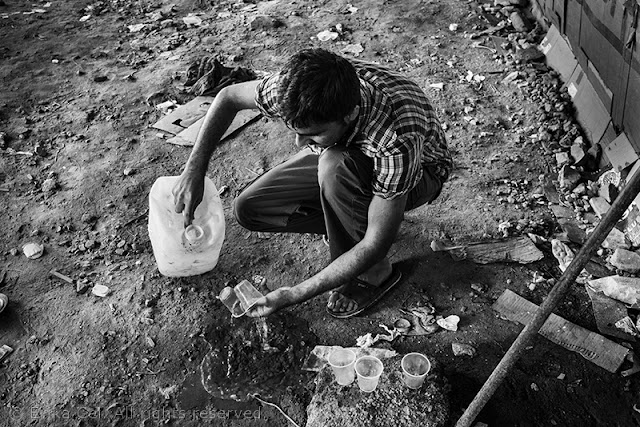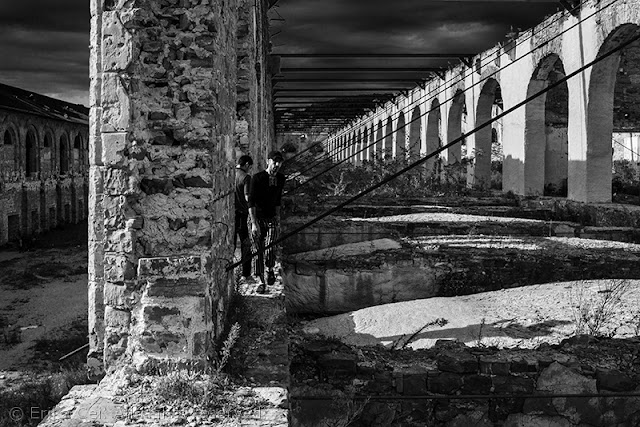There are three ways to approach diversity. The first one is to pretend that it doesn't exist, the second one is to oppose it, the third one is to accept it.
Whatever you think about, you're welcome. And I'm glad to share with you these simple tips for living in peace with diversity and enjoying it.
The following suggestions are addressed to everybody, but some of them are intended for my fellow citizens in Trieste, some of whom, in the last months, are suffering a sort of amnesia. The growth of refugees in town has triggered parochial and anti-immigration attitudes, in clear contradiction with the actual multi-ethnical composition of the local population. These attitudes, even if not widespread, are part of the daily agenda and achieve publicity in the local press (which allows web comments like "Throw them in the sea, and stop with this rigmarole! It's time to get them out of here!") and in the social networks (a Facebook group, named "Stop immigration in Trieste", counts more than 1000 members).
If we don't do anything against all this, there's a risk that things will get worse. This is the reason why I decided to share with you the following suggestions. By the way, some of them are addressed to the refugees and, in general, to people who move to another country: with the right information many mistakes and misunderstandings can be avoided, thus nipping in the bud further intolerant and xenophobic attitudes.
Are you ready?
Let's start!
1) Do you remember Galileo Galilei? He showed that the Earth moves around the Sun, not the opposite. Start by considering yourself as the Earth and not the Sun.
2) Recognize the other in yourself. Very easy task for anybody. Think about this: when you have to make a decision and a part of you says "yes" and another says "no", what are you doing? Provided you're not mentally insane, with whom are you dialoging? With yourself. This is… the other;
3) Recognize yourself in the other. This is easy if you naturally feel empathy for the others and it's not difficult for you to put yourself in their shoes. But if you don't feel such empathy don't worry: everything has a solution. Just find a person with the same eye color as you and look straight into them. You'll see your image reflected as in the mirror of your home. You'll recognize yourself in the other;
4) Communicate with the other. If you don't' speak his/her language, try with the English or French that you used in school: something is better than nothing. On the other side, if you don't speak the language of the country where you live, just learn it! I'm sorry, but you don't have other possibilities.
5) Learn the written rules of the country where you live and don't feel free to do what you want: you're a guest, act accordingly, please!
6) Learn the customs and traditions of the country where you live. You'll never be accepted if you don't' care about. This is particularly true with regard to the men-women relationship;
7) Learn the customs and traditions of people coming to your country. It's not difficult: in Trieste, for instance, you can go around, stop and start to talk with a group of guys coming from Kurdistan, Pakistan or Afghanistan and simply ask them about their customs. And while you're at it, ask them why they left their home, their families, their school mates, their friends, their brides. I'm sure that you already know the answer but if you hear their stories from their mouths you'll probably be less vulnerable to prejudices and racist parties, social network groups, web stupid comments;
8) Find the opportunity to meet the others. If there isn't, just create it. Do you think it's not possible? I'm going to prove the opposite. Last Saturday a group of people of different age, nationalities, customs, jobs, abilities, traditions, sexes, etc.. got together with the common aim to help keeping the town clean. Organized by Trieste green, in collaboration with ICS and Oltre quella sedia, the event started at 10 AM and finished at 3 PM. After hours spent picking up trash on sidewalks, trees, squares and gardens, all participants took some rest and filled their hungry stomaches with delicious food (Bombay byriani, chapati, kustar) prepared by some pakistani refugees. This was a great opportunity to meet other people, to talk with them, to learn something from them, to enjoy all together in our mutual diversity.
I hope that now you're a little bit convinced that you can live with diversity and enjoy it. If not, read again the above 8 tips and if it's not enough yet, take a look at the pictures.
That's all.
Whatever you think about, you're welcome. And I'm glad to share with you these simple tips for living in peace with diversity and enjoying it.
The following suggestions are addressed to everybody, but some of them are intended for my fellow citizens in Trieste, some of whom, in the last months, are suffering a sort of amnesia. The growth of refugees in town has triggered parochial and anti-immigration attitudes, in clear contradiction with the actual multi-ethnical composition of the local population. These attitudes, even if not widespread, are part of the daily agenda and achieve publicity in the local press (which allows web comments like "Throw them in the sea, and stop with this rigmarole! It's time to get them out of here!") and in the social networks (a Facebook group, named "Stop immigration in Trieste", counts more than 1000 members).
If we don't do anything against all this, there's a risk that things will get worse. This is the reason why I decided to share with you the following suggestions. By the way, some of them are addressed to the refugees and, in general, to people who move to another country: with the right information many mistakes and misunderstandings can be avoided, thus nipping in the bud further intolerant and xenophobic attitudes.
Are you ready?
Let's start!
1) Do you remember Galileo Galilei? He showed that the Earth moves around the Sun, not the opposite. Start by considering yourself as the Earth and not the Sun.
2) Recognize the other in yourself. Very easy task for anybody. Think about this: when you have to make a decision and a part of you says "yes" and another says "no", what are you doing? Provided you're not mentally insane, with whom are you dialoging? With yourself. This is… the other;
3) Recognize yourself in the other. This is easy if you naturally feel empathy for the others and it's not difficult for you to put yourself in their shoes. But if you don't feel such empathy don't worry: everything has a solution. Just find a person with the same eye color as you and look straight into them. You'll see your image reflected as in the mirror of your home. You'll recognize yourself in the other;
4) Communicate with the other. If you don't' speak his/her language, try with the English or French that you used in school: something is better than nothing. On the other side, if you don't speak the language of the country where you live, just learn it! I'm sorry, but you don't have other possibilities.
5) Learn the written rules of the country where you live and don't feel free to do what you want: you're a guest, act accordingly, please!
6) Learn the customs and traditions of the country where you live. You'll never be accepted if you don't' care about. This is particularly true with regard to the men-women relationship;
7) Learn the customs and traditions of people coming to your country. It's not difficult: in Trieste, for instance, you can go around, stop and start to talk with a group of guys coming from Kurdistan, Pakistan or Afghanistan and simply ask them about their customs. And while you're at it, ask them why they left their home, their families, their school mates, their friends, their brides. I'm sure that you already know the answer but if you hear their stories from their mouths you'll probably be less vulnerable to prejudices and racist parties, social network groups, web stupid comments;
8) Find the opportunity to meet the others. If there isn't, just create it. Do you think it's not possible? I'm going to prove the opposite. Last Saturday a group of people of different age, nationalities, customs, jobs, abilities, traditions, sexes, etc.. got together with the common aim to help keeping the town clean. Organized by Trieste green, in collaboration with ICS and Oltre quella sedia, the event started at 10 AM and finished at 3 PM. After hours spent picking up trash on sidewalks, trees, squares and gardens, all participants took some rest and filled their hungry stomaches with delicious food (Bombay byriani, chapati, kustar) prepared by some pakistani refugees. This was a great opportunity to meet other people, to talk with them, to learn something from them, to enjoy all together in our mutual diversity.
I hope that now you're a little bit convinced that you can live with diversity and enjoy it. If not, read again the above 8 tips and if it's not enough yet, take a look at the pictures.
That's all.
































